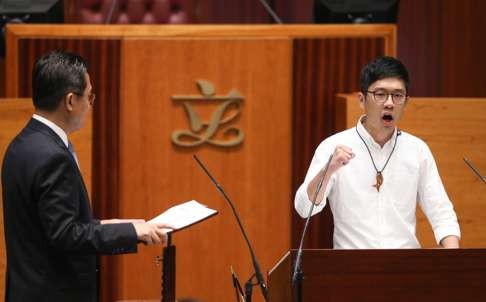
Hong Kong lawmakers accused of setting aside solemnity in taking oaths
Government issues writs to seek disqualification of Nathan Law, ‘Long Hair’ Leung Kwok-hung, Lau Siu-lai and Edward Yiu
The government is accusing pan-democratic lawmakers of setting aside solemnity in exchange for a political showdown by slipping pro-democracy messages into their oaths in its latest legal move to strip four legislators of their Legco membership.
The new writs filed by the government on Friday argued that Nathan Law Kwun-chung used a Mahatma Gandhi statement to make the point that the oath was a “political tool” to subject him and fellow lawmakers to authority, while “Long Hair” Leung Kwok-hung’s call for universal suffrage was a deliberate bid to “turn the occasion into an open display and vindication of his political agenda and belief”.
Chief Executive Leung Chun-ying and Secretary for Justice Rimsky Yuen Kwok-keung are targeting Leung, Law, Lau Siu-lai and Edward Yiu Chung-yim in their latest legal moves.

The government is asking the court to declare that the four declined or neglected to take their oaths in October and November, and their seats should therefore be vacated.
It also challenges Legco president Andrew Leung Kwan-yuen and Legco secretary general Kenneth Chen Wei-on’s decisions to approve their oaths or allow them to retake them when their first attempts were ruled invalid.
The writ against Leung Kwok-hung argued that what he did on October 12 was a political display. He held up a yellow umbrella with the words “end one-party dictatorship” on it. He was also wearing a black T-shirt with the words “civil disobedience” and chanted “self-autonomy and self-determination for the people”.
It was validated by Kenneth Chen, but the writ said Leung fell short of being sincere, as required by Article 104 of the Basic Law.

Nathan Law, the writ said, was insincere when he raised the tone of his voice in saying the word China in his oath.
“More importantly, he stated that he will absolutely not bear allegiance to a political administration which brutally killed its people,” the writ said.
Although Law did not specify which administration he meant, the writ added, it “could only be taken to mean” it was Beijing or Hong Kong because of the context.
As for Lau, whose first oath was later declared invalid as she paused for six seconds between each word, “the effect of such manner ... was that the words of the oath became totally disconnected and incomprehensible,” the government argued.

The writ said this was reinforced by a subsequent message posted on a Facebook page affiliated to her, saying that the words were deliberately broken up to be rendered meaningless.
On taking his first oath, Yim added details saying he would fight for universal suffrage and the sustainable development of Hong Kong, which the government argued formed part of the oath.
Both Yau and Yim were allowed to take a second oath after their first attempts were ruled invalid, but the government argued Legco did not have such power.

